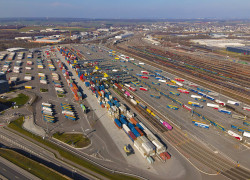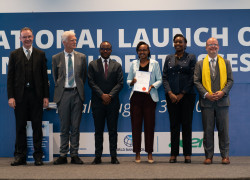Deloitte Luxembourg: Organisations are not ready to adjust to 21st century workforce
Survey reveals that organisations are not ready to address the striking shift in employee expectations, resulting in potential retention and leadership crises
This year, the human capital survey set out to analyse the HR and talent trends which we believe will most significantly impact organisations in the near future. The report focuses not only on 12 main global trends for organisations but also on the readiness of both the business and HR leaders to address these challenges
Filip Gilbert, partner and Human Capital Leader at Deloitte Luxembourg
A significant gap exists between the talent and leadership issues organisations face and their readiness to respond, according to the results outlined in the Deloitte’s Global Human Capital Trends 2014 survey of over 2,500 business and Human Resource (HR) professionals from 94 countries around the globe of which 120 from Luxembourg.
Filip Gilbert, partner and Human Capital Leader at Deloitte Luxembourg explains, “This year, the human capital survey set out to analyse the HR and talent trends which we believe will most significantly impact organisations in the near future. The report focuses not only on 12 main global trends for organisations but also on the readiness of both the business and HR leaders to address these challenges.”
In Luxembourg, respondents recognised the need to take action on critical issues including leadership (85%), retention and engagement (77%) and reskilling the HR function (77%). However, many expressed reservations about their organisations’ readiness to address the issues. According to the survey, the top three trends pertinent to Luxembourg professionals are:
1. Developing leaders at all levels
Respondents felt that developing leaders at all levels was the top issue facing the majority of organisations, yet 29% believe they were not ready to put in place the necessary structure to maintain a consistent succession. Lack of readiness for development was also reported throughout EMEA organisations with a readiness gap of 32%; slightly lower than the global figure of 34%.
2. Beyond retention: building passion and purpose
Retention and engagement of employees was the second top challenge in the Luxembourg workforce. One of the changes resulting in the quest for higher retention has been the corporate embrace of ‘flexibility’, an emerging matter of utmost importance to many workers. However, flexibility alone does not ensure retention. Purpose and meaning in the work itself is also accountable. In this aspect, Luxembourg organisations’ readiness gap stands at 21%, the same as for EMEA survey respondents and slightly lower than for global respondents (23%).
3. HR playing catch up
The survey reveals that many HR teams are perceived to lack the skills needed to meet the challenges of today’s business environment characterised by disruptions in labour markets, evolving workforce demographics, shifts in technology and the changing nature of work itself. In fact, more than one-third (35%) of the respondents believe that their HR and talent programmes are just ‘getting by’ or even ‘underperforming’.
“The strategy approach of human capital is a determining factor in building a successful business.” said Filip Gilbert. “One of our main findings in this research is that reskilling HR teams is one of the most critical mission for organisations today. As HR technologies among other factors impact in the attracting, retaining and developing of talent, companies must change their management approach and work towards continuous innovation and reengineering human capital practices.”
Further trends were observed on a global level, the key trends falling into three major categories: attracting and engaging; leading and developing; and transforming and reengineering the HR function:
Attracting and engaging
- The overwhelmed employee. Information overload and the always connected, 24/7 work environment are overwhelming workers, undermining productivity and contributing to low employee engagement. More than one-third (34%) of business leaders rate this issue among their top five priorities and fewer than one in ten believe they are dealing with it effectively.
- Reinventing talent acquisition. Even as the majority of organisations (62%) rely on social media channels for sourcing and advertising positions, when it comes to fully utilising analytics for recruitment and staffing, more than half (54%) indicate that their practices are ‘weak’.
- Engaging the 21st century employee. Millennials will make up 75% of the workforce by 2025, yet 58% of executives indicate that their companies are not ready to attract and retain Millennials and report they have ‘weak’ capabilities when it comes to ‘providing programmes for younger, older, and multi-generation workforces’.
- Shifting from diversity to inclusion. Nearly all organisations promote diversity, but most fail to realise the business benefits of a diverse workforce. One-third (34%) of companies say they are unprepared in this area, while a small 20% claim to be fully prepared.
Leading and developing
- Developing leaders at all levels. 86% of business leaders rate leadership as ‘urgent’ or important, however, only 13% say they do an excellent job in developing global leaders – creating the largest readiness gap found in the survey.
- Corporate learning redefined. More than two-thirds (70%) of executives see new learning methods, such as free online and mobile learning platforms, as ‘urgent’ or ‘important’, yet only 6% say they have mastered the content and technology capabilities needed to make online learning accessible and compelling for their employees.
Transform and reinvent
- Delivering on big data. Big data is increasingly enabling HR departments to make informed talent decisions, predict employee performance and conduct advanced workforce planning. However, only 7% of organisations today believe they have the capability to use data analytically.
- Racing to the cloud. Two thirds of business leaders believe that HR technologies are urgent and important and yet 56% report no definitive plans for their HR systems.
The complete version of the Global 2014 Human Capital Trends report as well as all results relevant for Luxembourg can be downloaded from the Deloitte Luxembourg website at: http://www.deloitte.com/lu/human-capital-trends-2014
Communiqués liés
RSA launches technology and management liability insurance s...
RSA Luxembourg, part of Intact Insurance Specialty Solutions, today announces th...
Lancement d'une nouvelle connexion intermodale entre Bettemb...
CFL multimodal a le plaisir d'annoncer le lancement de sa nouvelle connexion i...
Experts from LUNEX award first micro-credentials in Rwanda o...
The Rwanda Ministry of Education (MINEDUC) formally inaugurated Syllabi, a publi...
ERG Notes that ENRC Secures Landmark Victory as Court of App...
Eurasian Resources Group (ERG), a leading diversified natural resources group he...
LetzToken et La Vie est Belle annoncent leur partenariat ouv...
«?LetzToken?», plateforme de tokenisation pionnière basée à Luxembourg, et ...
ERG announces a Pre-Export Finance Facility Agreement based ...
Eurasian Resources Group (“ERG”, “The Group”), a leading diversified nat...
Il n'y a aucun résultat pour votre recherche







